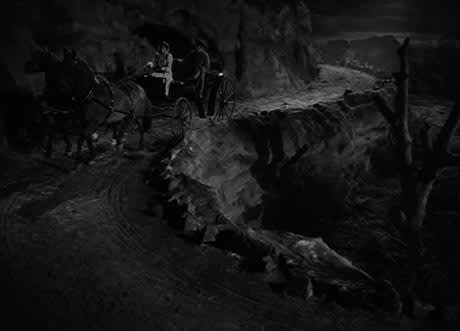Herewith three WWII -era black and white offerings from John Brahm, a semi-forgotten German import and Fox contract director who was nudged by the studio into a psychological thriller subspecialty, apparently to play off the noir craze that was then in its early flowering. First up is The Undying Monster, released a year after, and obviously something of a response to, Universals 1941, genre-defining The Wolf Man. The shortest (63 minutes) and slightest of the trio, and the only one clothed in traditional horror trappings, UM actually manages to be a somewhat interesting hybrid of horror and Holmes-ian detection. After a series of grizzly murders on a remote English estate, a Nick and Nora Dunn-ish police duo, spritzing with amusing but tension-dissipating wisecracks, bring their forward-looking, paleo-CSI methods to bear. Though there is a monster - glimpsed only briefly, and kind of wookie-esque - the ultimate solution is less supernatural than reassuringly scientific. Hindered by stagy acting, over-determined music and a too-obvious Hollywood back lot England (British accents strictly optional), UM succeeds best as a showcase for Brahms low angle/high contrast lighting effects, which lay an interesting German expressionist patina on what is otherwise a fairly flaccid genre piece.
Unlike UM, 1944s The Lodger, a remake of Hitchcocks 1927 silent Jack the Ripper meditation, aspired to transcend the b-movie ghetto, larding on a big budget, big stars (Merle Oberon, George Sanders) and a campaign promising "high-class horror. Though the Rippers famously intricate anatomical predations are of course entirely offscreen (torture porn, this aint) this Lodger is trendsetting in its upfront treatment of sex and sexual deviance. The hulking Laird Cregar in the title role, playing a pious and gentlemanly pathologist with severe actress issues, is effective with the pathos - his Ripper is victim as well as victimizer - and surprisingly brave with the surreptitiously gay (and maybe even incestuous) subtext. With apologies to the Fox flacks, none of these three is a "classic, but this comes closest.
1945s Hangover Square was based on a novel that Cregar brought to Fox, only to see it progressively massaged, to his dismay, into a kind of Lodger 2, to capitalise on that films unexpected success. Here, Cregar plays a composer who commits murders during spells of amnesia, brought on by discordant sounds (effectively, hes a wolfman with superior grooming). As in Lodger, our hero is brought low, Blue Angel-style, by a performing woman, here duplicitous music hall thrush Linda Darnell. Though HS is mightily aided by Bernard Herrmann, Hitchcocks go-to composer, there is nothing here that isnt done better in the earlier film. Note, though, the sad postscript: Cregar, unhappy with his size (which he felt kept him from romantic leads), and conflicted about his homosexuality, submitted to a primitive stomach-stapling, apparently hastening a fatal heart attack just weeks before the films release. Fox has been generous with the extras, including featurettes on Brahm, Cregar, and the making of The Lodger; two vintage radio plays starring Vincent Price; copious commentary tracks, trailers, and production stills; and various other goodies which, in the aggregate, are likely more diverting than the movies themselves.
(Fox)Fox Horror Classics
John Brahm

BY Paul DuderPublished Dec 6, 2007